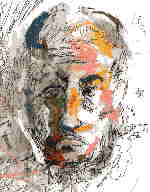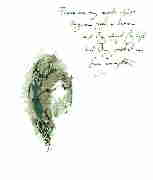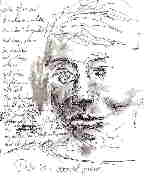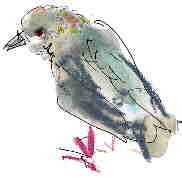in memoriam
Katie was born on the 9th April 1914.
She died on the 18th December 2005.
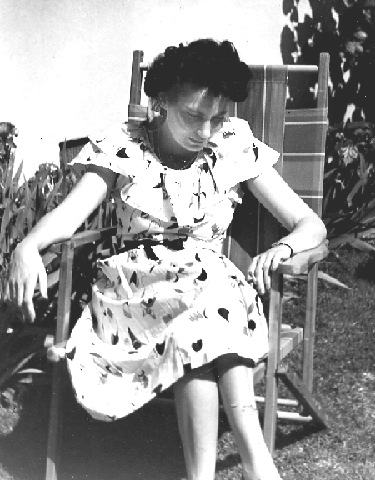
Janet Hadley and Innes Herdan write: "Our friend, Kate Allan, who died in December, aged 91 lived a life that was touched by some of the defining moments of the 20th century. She had lived in Britain for more than 50 years, originally coming to this country as an American citizen, seeking refuge from the artistic and political repression of the House Committee on Un-American Activities, which from 1947-1953 was investigating Hollywood for Communists and `subversives'.
Kate was the youngest of five children, born in Boston to parents of Russian origins, who had fled the anti-Jewish pogroms of the late 1890s. With a musical talent which at one time might have taken her to a career playing classical piano, she was involved in the 1930s with left-leaning actors and musicians in New York who honed their skills in theatre groups with radical perspectives. There she met her first husband, John, who joined the anti-fascist volunteers fighting in Spain against Franco and was killed there soon after their marriage.
The man who brought her the terrible news, Ted Allan, became her second husband. They lived in New York but after the war as the House Committee on Un-American Activities stepped up its attacks on Hollywood actors, and writers such as Ted, they lived for a time in Canada and in Mexico.
When they settled in London in the 1950s, Kate can hardy have imagined that she would spend the rest of her life there. After the children were born and she and Ted separated, she and her lifelong friend Tana Sayers took in lodgers in Elsworthy Road, Swiss Cottage. Kate was a friend of a great many writers and artists, including Al Alvarez, Mordecai Richler and Bernard Vorhaus. Although most would agree that her driving skills were not her best point, she drove to Italy with her children - a brave thing to do for a woman alone in the days when cars were prone to breaking down.
In the 1960s she became involved with the Society for Anglo-Chinese Understanding, which organised cultural exchanges with China, and was until the opening up of tourism to China, just about the only way in which one could visit China, in closely monitored `study groups'. Many who remember her from that time recall a vibrant, erratic and unforgettable woman - by now in her sixties, padding around on the stairs of the Society's rickety little office in Camden Town, singing old show tunes. She was also an enthusiastic poker player.
Kate was a terrific cook and loved to discuss food: she recalled a special meal in China in which Chinese government officials plied her with a mysteriously crunchy something in a mustardy sauce. It was `marvellous', Kate kept exclaiming - her favourite term for appreciated food, `but what is it?'. Learning that the crunchiness was ducklings' feet only made her pause a little in her delight in new tastes and textures.
She relished life, treasured friends, always offered a warm welcome, and was always ready to engage with the world of books and theatre. To many younger friends, and she had many - a sure sign in an older person of someone more than ready to engage with the world even as it is changing - she was an enthusiastic listener and supporter."
Innes
and Janet
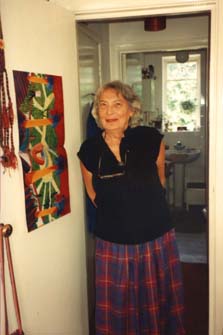
I force myself away from this image. I see her at the piano. I am about three. We had just moved from East 17th. Street in Manhattan to Sunnyside, Long Island, and she was pregnant with my baby brother. I am singing "Lazy Sheep Pray Tell Me Why" from the English nursery song book, "More Songs from Long Ago". She is playing as I sing.
They made a record of my singing and her playing, which I played when I was young and I remember the sweet high voice, perfectly in tune, singing my favourite songs from that book. The record is lost, but not the memory.
I love to sing. She taught me every folk song I know. I sang them to my children and now I sing them to my Grandson, Ted. Lord Randall, Golden Vanity, Raggletaggle Gypsies, Wayfaring Stranger, etc. etc. etc.
I don't think I want to live until I'm 91, especially if I am not in good health. It was an undignified end to a remarkable life. I want to remember the music. It will always be with me.
Julie
Allan
March 7, 2006
Beverly Hills, California
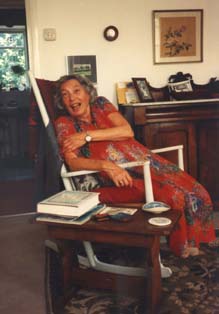
I want to post three consecutive pieces from the sketch book I was working on as my mother left... click on them to see a larger version and the text. In the picture at the left, the left side of the face is rubbed through to give the smudges in the next two pictures. That's why they are a set. On the third piece I drafted a "poem" about Kate's departure... The poems doesn't quite work (ditto the first picture), but is posted below.
This is a scarred piece
Julie
it is sad
to scatter our mother
her ashes in the garden
her memories
sad and happy with us
I'll store the chinaman with Seth
the rocking chair
should go to Wales
the framed picture of her beside her tiny car is for me
I
loved my mother as well as I could
and she loved me
Broken Tulips
a
short story by Norman Allan
I was standing with my mother and my children in Brighton’s central "square", the Olde Steine. There had been a storm the night before and three year old Seth asked if he could step over the small fence to pick out the broken stemmed tulips in the bed that ringed the fountain. "Sure," I said, and five years old Jessi joined him. Mother and I stood talking.
Mother must have been disappointed in her dropped-out divorced son. Me a would be writer, writer like her ex who’d walked out. She was certainly disappointed in my long hippie hair. (This is the nineteen seventies.) For years the first thing she would say when we met was, "When are you going to get your hair cut?"
"When are you going to get your hair cut?" I did not get on with my mother.
My new girl friend was handicapped. "You’ll have to take taxis."
We talked.
As we talked we were approached by an old lady (with another old lady and an elderly gentleman in tow). The old biddy came up to us, ignored my mother and I, and addressed my young children. "Your father should have told you not to pick the flowers," she said.
I was stunned.
I roared. Like a lion. "Arrrhh!"
The little old lady froze. Extended moments. At least a second or two.
I twitched, bobbed my head forward. The little old lady ran.
My mother made no comment. I would speculate that she was both shocked and proud… proud that we were the alpha lions on the square. (Is that young man’s, an immature young man’s thought?) Proud that I would defend my children? More shocked than proud. I guess.
The fact that she made no comment, though, made a big impression on me. It wiped out all those years of "when are you going to get your hair cut?"
A couple of hours latter, we were walking down to the station - Mommy
was going back up to London - and she did ask, quietly, if I thought I needed
any (psychotherapeutic) help.
Well, nobody’s perfect.
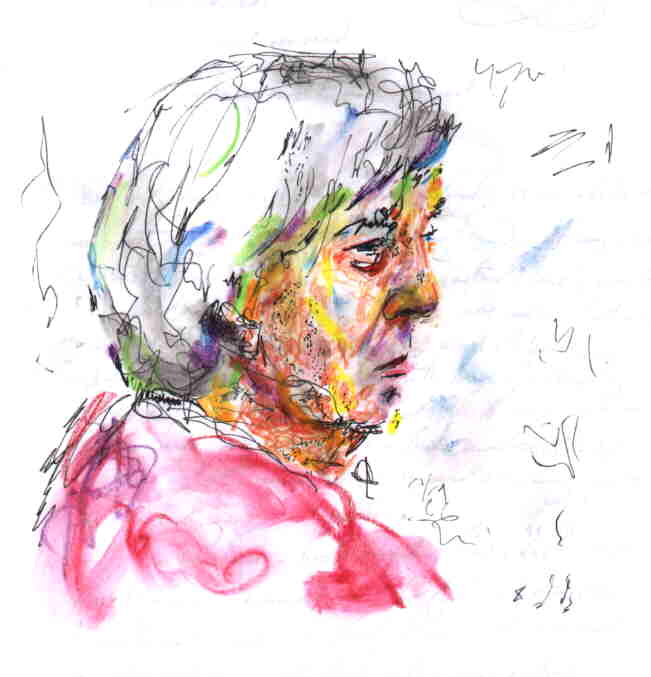
Kate in her late eighties
Janet
Hadley and Innes Herdan
Monday March 6, 2006
The Guardian
Kate Allan, who has died aged 91, came to live in Britain as an American citizen
seeking refuge from the repression of the House Committee on Un-American Activities,
which, from 1947 to 1953, was combing Hollywood for communists and "subversives".
Kate was the youngest of five children, born in Boston to parents of Russian origin, who had fled the anti-Jewish pogroms of the 1890s. With a talent that, at one time, might have taken her to a career playing classical piano, she was involved with left-leaning actors and musicians in the New York of the 1930s. There she met her first husband, John, who joined the volunteers fighting in Spain against Franco and was killed there soon after their marriage.
The man who brought her the news, Ted Allan, became her second husband. When they settled in London in the 1950s, Kate can hardly have imagined that she would spend the rest of her life there. After her children, Norman and Julie, were born, she and Ted later separated. Kate was a friend of a great many writers and artists, including Al Alvarez, Mordecai Richler and Bernard Vorhaus. Although most would agree that her driving skills were not her best point, she drove to Italy with her children - a brave thing to do for a woman alone in the days when cars were prone to breaking down.
In the 1960s she became involved with the Society for Anglo-Chinese Understanding, which organised cultural exchanges with China, and was, until the opening up of tourism, just about the only way that one could visit China, in "study groups". Many who remember her from that time recall a vibrant and unforgettable woman - by now in her sixties, padding around on the stairs of the Society's rickety office in Camden Town, singing old show tunes. She was also a keen poker player.
Kate was a terrific cook and loved to discuss food: she recalled a meal in China in which government officials plied her bowl with a crunchy something in a mustardy sauce. It was "marvellous", Kate kept exclaiming, "but what is it?". Learning that it was ducklings' feet only made her pause a little in her delight at new tastes and textures.
She always offered a warm welcome, and was ready to engage with the world of books
and theatre. To many younger friends, and she had many, she was an enthusiastic
listener and supporter.
please send contributions to normanallandr@yahoo.ca
Norman's
homepage is
www.normanallan.com
